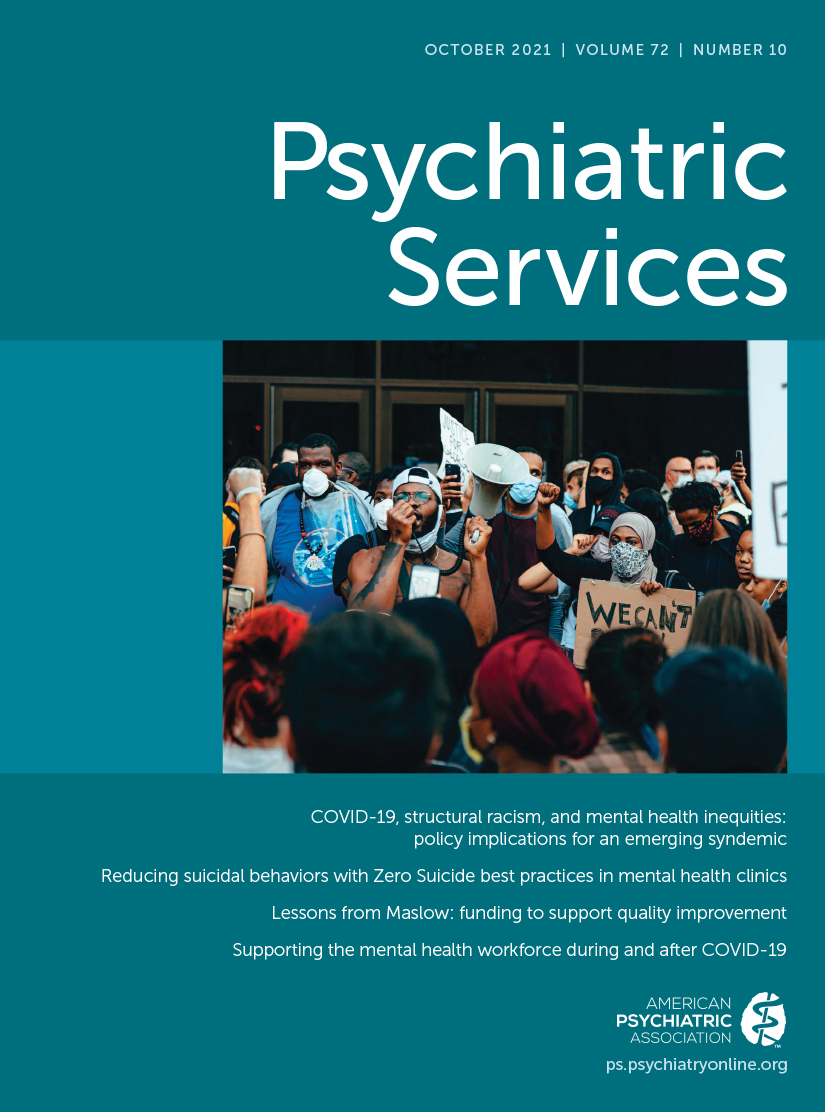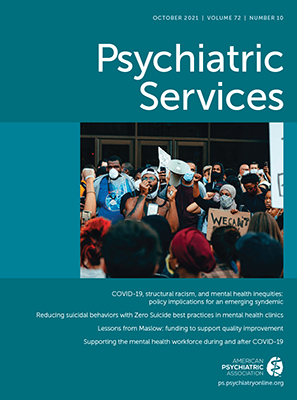Early intervention for patients experiencing their first episode of psychosis (FEP) is critical to improving their clinical trajectory and quality of life. The ability to access comprehensive clinical services is linked with whether individuals have insurance coverage and, when they do, what type of insurance they have. In particular, the ability to acquire public insurance, particularly Medicaid, is a critical mechanism by which individuals receive services and evidence-based care that may not otherwise be available to them. Likewise, continuity in insurance coverage is correlated with remaining in treatment. In this issue, Golberstein et al. describe insurance changes and stability for young adults with FEP (
1).
The authors report that compared with young adults in the general population, individuals of the same age with FEP had more insurance instability, or changes to their insurance, and were more likely to be uninsured. Almost half of patients included in the study experienced at least one insurance change. A quarter of those with insurance at the beginning of the study experienced uninsurance during the study period. The authors further report that the highest levels of insurance instability were found among those with private insurance at presentation, with 30% losing private insurance coverage within 12 months, compared with 7% in the general population. Of the people with FEP who lost private insurance coverage, approximately one-third were uninsured 1 year later.
An important finding of this study was that age of the patient correlated with insurance stability. Individuals with FEP and of ages 24 or 25 at baseline were less likely to have private insurance on follow-up and were more likely than those under 24 to have a period of uninsurance during the study period. This can be partially explained by the dependent mandate in the Affordable Care Act, which allows individuals to remain on their parents’ insurance until age 26. Another reason for loss of private insurance among these individuals could result from job loss due to their mental illness. These findings highlight the difficult nature of the transition from private insurance to alternative coverage. Preventing uninsurance and smoothing the transition to new insurance would likely improve the continuity of care for these patients.
Expanding insurance coverage, particularly public insurance, to patients with emerging psychosis may be critical for helping individuals access and maintain services. Expansion could be achieved through a delinking of disability and Medicaid eligibility or expanding access to Medicaid for patients who meet criteria for FEP. One mechanism for this may be through Section 1115 waivers where states can apply for pilot or demonstration programs that use innovative approaches to improve the health and well-being of their population. Some states have already explored such waivers to help patients with FEP qualify for Medicaid or expanded services. For those with commercial insurance, a similar mechanism to qualify for Medicaid through Section 1115 waivers would be extremely valuable. Importantly, securing Medicaid coverage would not necessarily preclude individuals from maintaining their commercial insurance, because Medicaid could assume a secondary role. Such an arrangement would not only prevent periods of uninsurance for patients who lose their commercial insurance but also streamline access to critical publicly funded programs for persons with serious mental illness. For example, through Massachusetts Medicaid (MassHealth), children and young adults with mental illness have access to the Children’s Behavioral Health Initiative, which provides expanded services, intensive care coordination, and crisis intervention.
In summary, individuals with FEP are a particularly vulnerable cohort; they are at elevated risk of experiencing uninsurance and have notable longitudinal clinical needs. Any interruptions in these services can lead to emergency department visits, hospitalizations, and poor clinical outcomes. By guaranteeing Medicaid coverage for these high-risk individuals, states can adopt a proactive approach and ensure that no patient with FEP experiences clinical decompensation due to a lapse in insurance coverage. Additionally, states can make certain that all patients with FEP and their families have access to evidence-based, publicly funded treatment programs. In many ways, this investment would lead to fulfillment of the triple aim—better treatment outcomes for patients with FEP, higher value of care provided, and an improved patient experience.

